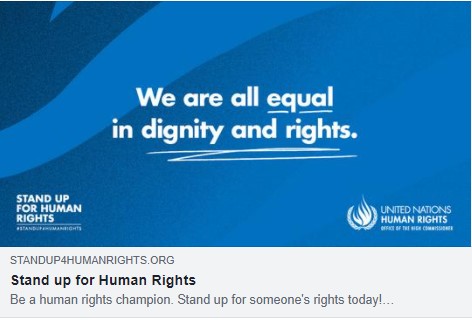This is an archive of news stories and research from the National Union of Public and General Employees. Please see our new site - https://nupge.ca - for the most current information.
"NUPGE urges governments to act to meet their human rights obligations on this International Day for Human Rights and to understand that these obligations go beyond their borders." — Larry Brown, NUPGE President

Ottawa (10 Dec. 2021) — As the world continues to address the evolving pandemic, more consideration is being given on how to rebuild. The National Union of Public and General Employees (NUPGE) believes it is critical that respect for human rights are at the core of our work. This is why, this International Human Rights Day, NUPGE is supporting the theme of EQUALITY — Reducing inequality, advancing human rights.
The Declaration
The foundation of international human rights law is the UN's Universal Declaration of Human Rights (the Declaration). International Human Rights Day is commemorated on December 10, the day in 1948 when the Declaration was proclaimed. The Declaration remains one of the UN’s major achievements, and an important instrument and symbol in the fight for justice and equality worldwide. Unfortunately, the pandemic has caused a noticeable regression in terms of respect for human rights, equality and fairness. The need to fight for vaccine justice is an example of the damaging effect of inequality.
Vaccine justice, vaccine apartheid
Global calls for vaccine justice, as we face the increased virulence of the Omicron variant, speak to the damage done by inequality. As wealthy countries open up for 3rd dosages of the vaccines, the impoverished parts of the world have often not even vaccinated their frontline health care workers, with fewer than 1 in 10 health workers in Africa having been fully vaccinated.
This article in BMJ Journals makes the case against a charity model for vaccine distribution and names the result of the failed model as vaccine apartheid. More than 80% of administered doses have gone to richer countries with the inequality getting worse rather than abating in the face of fears about the new variant.
Access to vaccines and health care a human right
NUPGE has continued calling for Canada to support global access to COVID-19 vaccines. We are supporting an intellectual property rights waiver at the World Trade Organization. NUPGE has also joined calls for a further waiver on intellectual property rights on COVID-19 medical products. For more information, see Global Citizen's article about COVID-19 Vaccine Intellectual Property Rights.
No one is safe until everyone is safe
"It has been over a year since the demand for a TRIPS waiver was put forward, and still there has been no progress," said Larry Brown, NUPGE President. "Powerful countries, including Canada, have been stalling or blocking these initiatives, and the result is that poorer countries do not have the vaccines that they need to protect their citizens. Rising variants can be directly related to policies which block truly mass vaccination. Everyone is vulnerable when COVID-19 is allowed to flourish in poor countries because wealthy countries are not willing to ensure access for all."
The rallying cry by those calling for vaccine justice has been "no one is safe until everyone is safe." The rise of each new variant confirms the need to ensure vaccines are not hoarded by the wealthy countries for their own populations. We are already witnessing the results of broken promises and adherence to an intellectual property rights regime that disenfranchises most of the world. The UN High Commissioner for Refugees circulated a statement on the need for a global responses.
Impediments to vaccine equity
GAVI, the Vaccine Alliance, has pointed out that there are now 21 vaccines available, with 6.3 billion doses, and counting, having been administered. Wealthy countries are being driven by fear and politics to hoard vaccines, but we cannot ignore that this is also about profit. Pfizer says they will net $36 billion dollars this year from COVID-19 vaccine sales. As this editorial in the Guardian outlines, pharmaceutical companies are selling to wealthy countries at immense profits, taking us further from vaccine justice or truly mass vaccination against COVID-19.
A crossroads
"We are clearly at a crossroads, " said Bert Blundon, NUPGE Secretary-Treasurer. "The vaccine nationalism we have seen has lowered hospitalization and death rates in wealthy countries, but as new variants rise, the flaws in this strategy are fully exposed. Unless, and until, we implement a global strategy to deal with COVID-19 that includes more than platitudes about vaccine justice, the whole world will continue to struggle to contain this pandemic."
Reducing inequality and vaccine injustice within countries and around the world is key to ensuring we are all safe. The pandemic has caused great upheaval in our societies; it also provides an opportunity to rebuild better. To do that, however, governments must not slip into the well-worn path of nationalism. We must all think beyond our own borders and see that there is a great cost to inequality and the model of vaccine apartheid that we have allowed to proliferate.
"NUPGE urges governments to act to meet their human rights obligations on this International Day for Human Rights and to understand that these obligations go beyond their borders," said Brown.
